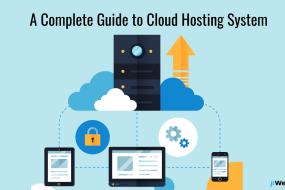
In today’s digital era, where data is the lifeblood of businesses, choosing the right hosting solution is crucial. Cloud hosting has emerged as a game-changing technology that offers unparalleled flexibility, scalability, and reliability. Unlike traditional hosting, which relies on a single physical server, cloud hosting harnesses the power of multiple interconnected servers, forming a vast network known as the cloud. This distributed infrastructure revolutionizes the way websites, applications, and services are hosted, providing a range of benefits that traditional hosting simply can’t match.
Understanding Cloud Hosting
What is Cloud Hosting?
Cloud hosting is a cutting-edge hosting solution that leverages the power of virtualization and distributed computing. Instead of relying on a single server, cloud hosting harnesses a network of interconnected servers to distribute the workload and ensure high availability. This dynamic infrastructure allows for seamless scaling, as resources can be allocated or de-allocated on-demand, based on the specific needs of your website or application.
The Key Differences
Scalability and Flexibility
One of the most significant advantages of cloud hosting is its scalability and flexibility. With traditional hosting, your website or application is limited by the resources of a single server. In contrast, cloud hosting allows you to scale your resources seamlessly. Whether you’re experiencing a surge in traffic or need additional storage space, cloud hosting empowers you to meet these demands without interruption.
Reliability and High Availability
Cloud hosting excels in terms of reliability and high availability. Traditional hosting relies on a single server, making it vulnerable to hardware failures, power outages, or network issues. In contrast, cloud hosting distributes the workload across multiple servers, ensuring that even if one server fails, your website or application remains accessible. This redundancy and fault tolerance minimize downtime, enhancing the overall reliability of your online presence.
Cost-Effectiveness
Cloud hosting offers a cost-effective solution compared to traditional hosting. With traditional hosting, you typically pay a fixed amount for a specific set of resources, regardless of whether you utilize them fully or not. Cloud hosting, on the other hand, operates on a pay-as-you-go model, allowing you to pay only for the resources you consume. This flexibility eliminates unnecessary costs, making cloud hosting an attractive option for businesses of all sizes.
Exploring Google Cloud Hosting Pricing
Google Cloud is a leading provider of cloud hosting services, offering a wide range of pricing options tailored to different business needs. Here are some key aspects to consider:
Pay-Per-Use Pricing
Google Cloud follows a pay-per-use pricing model, enabling you to pay only for the resources you consume. This allows for cost optimization as you have granular control over your expenses. Whether you require additional CPU power, memory, or storage, Google Cloud’s pricing model ensures you pay for what you need, when you need it.
Sustained Use Discounts
To incentivize long-term usage, Google Cloud offers sustained use discounts. As your usage increases, the discounts automatically kick in, providing cost savings. This pricing structure encourages customers to maintain their workloads on Google Cloud over an extended period.
Preemptible VMs
For workloads that can tolerate interruptions, Google Cloud offers preemptible VMs at significantly discounted rates. These VMs are suitable for tasks such as batch processing, data analytics, and video encoding. By leveraging preemptible VMs, you can achieve substantial cost savings without compromising performance.
Custom Machine Types
Google Cloud allows you to create custom machine types tailored to your specific needs. This flexibility enables you to optimize the performance and cost-efficiency of your workloads. By choosing the exact amount of CPU and memory required, you can fine-tune your resources, ensuring optimal performance without overspending.
Unleashing the Potential of Personal Cloud Hosting
What is Personal Cloud Hosting?
Personal cloud hosting is a revolutionary concept that brings the power of cloud technology to individuals. It allows you to store, access, and share your files, photos, videos, and other digital assets securely in the cloud. Personal cloud hosting transforms your personal storage into a versatile platform that can be accessed from anywhere, at any time, using various devices.
Advantages of Personal Cloud Hosting
- Data Security: Personal cloud hosting provides robust security measures to safeguard your valuable data. With encryption, authentication protocols, and access controls, you can trust that your personal files are protected against unauthorized access.
- Ease of Access: Personal cloud hosting enables seamless access to your files from multiple devices, including smartphones, tablets, and computers. This accessibility ensures that you can retrieve your data whenever you need it, regardless of your location.
- File Sharing and Collaboration: Personal cloud hosting simplifies file sharing and collaboration. You can easily share files with family, friends, or colleagues, granting them controlled access. Collaborative features enhance productivity and streamline workflows, making personal cloud hosting an excellent choice for remote work scenarios.
Frequently Asked Questions
FAQ 1: How does cloud hosting improve website performance?
Cloud hosting improves website performance by distributing the workload across multiple servers. This distribution allows for efficient resource allocation, reducing the chances of bottlenecks and ensuring faster loading times.
FAQ 2: Is cloud hosting suitable for e-commerce websites?
Absolutely! Cloud hosting offers the scalability and reliability that e-commerce websites require. With the ability to handle traffic spikes during peak periods and ensure uninterrupted uptime, cloud hosting is an excellent choice for online businesses.
FAQ 3: Can I migrate my existing website to cloud hosting?
Yes, you can migrate your existing website to cloud hosting. Many hosting providers offer seamless migration tools and support to assist you in the process. Additionally, they provide documentation and resources to guide you through the transition smoothly.
FAQ 4: Are there any downsides to cloud hosting?
While cloud hosting offers numerous benefits, it’s essential to consider potential downsides. One factor to keep in mind is dependency on internet connectivity. If your internet connection goes down, accessing your cloud-hosted resources may become temporarily unavailable.
FAQ 5: How secure is personal cloud hosting?
Personal cloud hosting prioritizes data security, employing encryption and robust access controls to protect your personal files. However, it’s always advisable to follow best practices, such as using strong passwords and enabling two-factor authentication, to enhance the security of your personal cloud storage.
Conclusion
Cloud hosting has revolutionized the hosting landscape, offering unprecedented scalability, flexibility, and reliability. By leveraging the power of multiple interconnected servers, cloud hosting empowers businesses and individuals alike to unlock the full potential of their online presence. Whether you’re considering cloud hosting for your business or exploring personal cloud hosting solutions, understanding the key differences, pricing models, and benefits is essential. We hope this comprehensive guide has shed light on cloud hosting and inspired you to make informed decisions to optimize your online endeavors.
.
Advertisement






